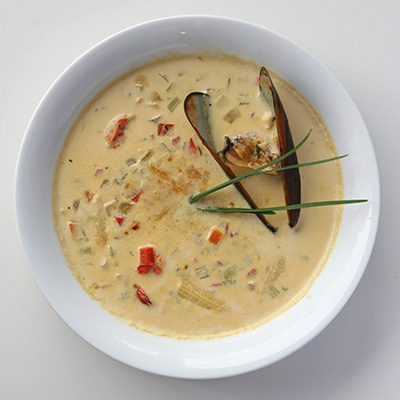Blue Mussels

Mytilus Edulis
Distribution: Worldwide, cold and temperate waters
Fishing Type: Farm Raised
Environment : Marine (salt water)
Characteristics
Mussels are bivalves and like most bivalves, mussels are filter feeders. In Canada, the industry is concentrated in Prince Edward Island, but mussel farms are also found in Quebec. As well as being tasty, blue mussels are nutritious.
Culinary tips and advice
Your will find fresh mussels in your Metro fishmonger's display.
- Mussels can be prepared in many interesting ways. Most often, they are cooked in chowder, meunière (butter and lemon juice), à la poulette (white stock, lemon, butter and parsley), à la diable (spicy) etc.
- Mussels are also delicious broiled, au gratin, sautéed, deep-fried, grilled en brochette, stuffed or marinated.
- They make wonderful appetizers, salads and omelets.
- Safeguard: discard any open mussels that do not close when tapped. This indicates that they are dead and no longer edible.
Nutritional value
The blue mussel is very rich in vitamin B, riboflavin, niacin, folic acid and vitamin B12. Mussels provide a generous amount of phosphorus, iron and zinc.
Storage life
Fresh mussels should be prepared as soon as possible after purchase.
| Refrigerator 4° C (40° F) | Freezer -18° C (-4° F) | |
| Fresh mussels with shells | Check expiration date | --- |
| Fresh shelled mussels | Check expiration date | 3 months |













